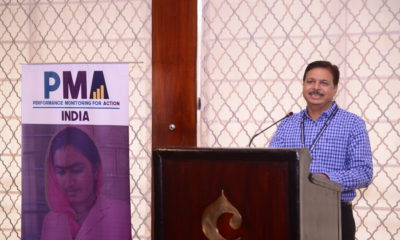Medical & Pharma
Most Popular Types Of Contraceptives To Suit Different Needs

Family planning and birth control have gathered much importance in recent days thus increasing the demand for contraceptives.
These contraceptives can help in avoiding unintended pregnancies which are one of the crucial public health issues worldwide. The multiple options available today have helped couples plan their family.
A woman can get pregnant when a man’s sperm reaches one of her eggs and fertilize it. Contraception is a way to stop pregnancy by keeping the egg and sperm apart, stops egg production, and also prevents the fertilized egg from attaching to the lining of the womb.
There are many contraceptive methods to suit different needs. Listed below are a few popular types of contraceptives: Barrier methods, Emergency Contraception Pill, Permanent Contraception, Long-acting Reversible Contraception, and Hormonal Contraception.
Barrier Method
In this method, a barrier is used to stop the sperm from entering the vagina. There are two barrier methods: Male and Female Condoms. The ‘male condom’ is one of the most popular contraceptives, where a thin latex or polyurethane sheath is placed around the erect penis before intercourse. The ‘female condom’ is placed inside the vagina before intercourse.
Emergency Contraception Pill
This method is followed to prevent pregnancy after sex if contraception was not used. The pill can also be taken if the condom used was ruptured. The pill contains special doses of female hormones. Though the pill is also known as the ‘Morning After’ pill, it can be effective up to five days after having unprotected sex. The sooner you take it, the more effective it will be.
Permanent Contraception
One should opt for this method only if they are certain that they do not want children in the future. This method prevents all future pregnancies and is almost impossible to reverse. That is the reason this method is popularly called ‘Sterilisation’. The method involves vasectomy and tubal ligation done by a trained health care provider.
Long-acting Reversible Contraception
As the name implies, Long-acting Reversible Contraception is reversible birth control that provides long-lasting pregnancy prevention. As you do not have the compulsion to remember it every day, this method is also called ‘fit and forget’ contraception. There are two types in this method: Intra-Uterine Device (IUD) and Implant.
In the Intra-Uterine Device, a T-shaped device is placed inside the woman’s uterus by a trained health care provider. Depending on the type of device used, the IUDs can be in place for three to ten years. In the second method, a doctor inserts an ‘implant’ (flexible rods) under the skin of a woman’s upper arm. It releases progestin hormone to prevent pregnancy for three years.
Hormonal Contraception
As the name indicates, this contraceptive method uses ‘hormones’ to prevent pregnancy. Hormonal contraception is available in the form of pills and Depo Provera injections. The pills come in two types: Combined Oral Contraceptive Pill and Progestogen-only Contraceptive Pill. The first type of pills, when taken regularly, prevents a woman’s ovary from releasing an egg during her cycle and the second type of pills (Progestins) makes the mucus around a woman’s cervix thick and sticky and prevents the sperm from progressing towards the egg.
If you do not want to take the pills every day, you can opt for the Depo Provera Injection which is given every three months into a woman’s buttock or the upper arm and each injection prevents ovulation.
The latest to be added is in this category is the NUVA RING. It is a hormonal method but unlike a pill, it is not necessary to take it every day. It is fitted by the user in the vagina once every 21 days.
Having listed the popular contraceptive techniques, you should be aware of the birth control methods which do not work well. The ‘withdrawal method’ of contraception is widely practiced. In this method, the penis is quickly withdrawn from the vagina before ejaculation. The goal is to prevent the sperms from entering the vagina and prevent pregnancy.
But the withdrawal method is not an effective form of birth control as the chances of sperm entering the vagina is high if the timing isn’t worked out properly. Also, the pre-ejaculation fluids could contain sperm leading to pregnancy. It is always advised to take the necessary precautions before having sex.
By Dr.Anuradha Lokare, Consultant-OBG, Columbia Asia Hospital Hebbal































